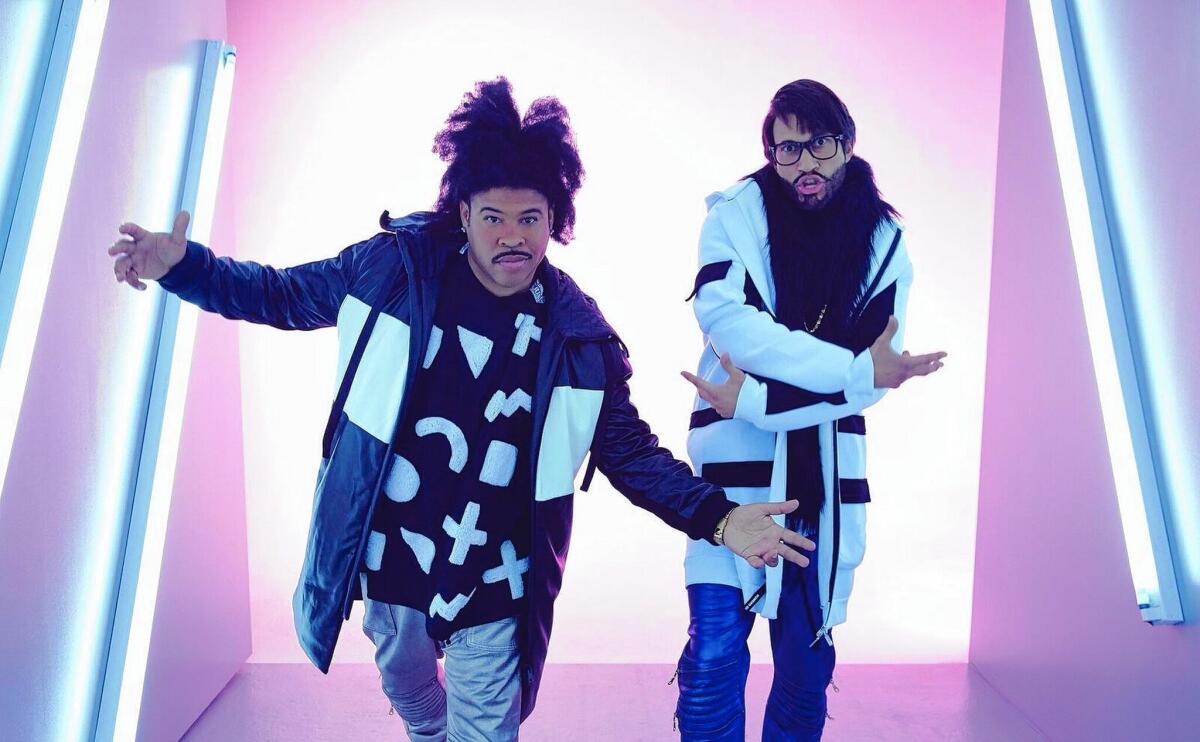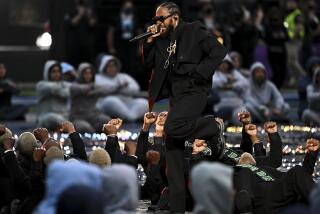Critic’s Notebook: The Super Bowl proves to be a huge platform for almost anyone with a message

It may have started with puppies, but now everyone wants in on the big game.
Key and Peele, Alicia Florrick, Jason Bourne, Stephen Colbert, Mother Jones, President Obama, Conan O’Brien, Tina Fey, James Corden — they all showed up, in one way or the other, during Super Bowl 50, and not to root for their favorite team.
With diminishing audiences for just about everything, the Super Bowl has become one of the few mass-media platforms still standing, and it isn’t just advertisers climbing aboard.
It’s the media themselves.
While the Carolina Panthers battled the Denver Broncos on Sunday, CBS took the opportunity to announce that the critically acclaimed series “The Good Wife,” and viewers’ relationship with Julianna Margulies’ Alicia, would end with this season, Universal unveiled a super-cut Matt Damon in the now officially named “Jason Bourne,” and various publications circulated stories and statistics about the danger of the game that everyone was watching.
In the best example of counterprogramming since Animal Planet launched the “Puppy Bowl,” the comedy team of Keegan-Michael Key and Jordan Peele appeared on Squarespace.com as Lee and Morris, two clueless lunatics realizing their dream of becoming Super Bowl commentators in a show called “Real Talk.”
With no knowledge of the game — “I don’t understand,” Key’s Lee said early on, “I thought you said the game lasted one hour” — and legally unable to provide actual commentary, the two spent the evening arguing with their lawyer, asking many questions of a guest referee, talking about their feelings and grilling callers about their party food.
Toward the end of the first quarter, however, they glanced at the television screen long enough to see the commercial for their show.
“That’s us,” they yelled, before returning to their hilarious interviews with a guest psychiatrist and their off-the-wall conversation about “a person who’s athletic and who’s done a very athletic thing.”
A pair of satiric digital Super Bowl commentators commenting on their non-satiric Super Bowl ad: Life does not get more media-meta than that.
Well, actually it did. The pair followed up their three-hour-plus performance on “Real Talk” by joining (in a pretaped segment) the special live postgame edition of “The Late Show With Stephen Colbert.”
Which also included an appearance by the president and has been promoted with a near-hysterical frenzy.
Watch the 2016 Super Bowl ads
Just as the Super Bowl ads are increasingly scrutinized, the show following the game has become the subject of much tea-leaf reading: Is the network going with its strongest player or trying to bolster the ratings of a critical favorite? The special live aspect of the “Late Show” only increased the heat (and, CBS clearly hopes, Colbert’s ratings). For days, the host appeared gold-toothed in ads promoting the game and served as referee between the teams and Rihanna in a spot bundling it with the Grammys.
On “The Late Show” he “covered” the event’s media day, getting Broncos and Panthers players to “answer” the question “What do you do to get pumped up?” (“I put on a tiny crown and say, ‘Who’s the prince of football?’” said Panthers quarterback Cam Newton.)
All this on top of the chorus line of celebrities who fill the game’s many commercial breaks, often making the evening seem more like an awards show than a sporting event.
But at this point, the Super Bowl is the only real safety raft available.
The great irony of the television renaissance is that the genre’s growing popularity has come at the cost of ratings. The increasing number of shows and platforms makes it impossible for even the most popular show to draw the huge numbers of days gone by.
Only the Super Bowl draws a real time national audience — more than 100 million viewers tuned in last year.
So this year, instead of fighting it, television decided to join it. For more than a week, morning, afternoon and late-night television was filled with football. Players, food, fashion, whatever could be connected, however loosely.
“The Late, Late Show With James Corden,” which follows “The Late Show,” caught the stadium tailwind and enlisted Elton John to play “Carpool Karaoke.” Though they had no network obligation, Conan O’Brien brought back his “Clueless Gamer: Super Bowl Edition” for the second year, playing the soon to be released “Doom 3” with Denver’s Von Miller and Carolina’s Josh Norman, while Jimmy Fallon brought it full circle by having this year’s “Puppy Bowl” participants predict the Super Bowl winner. (Those little darlings chose correctly.)
And it wasn’t just television talk shows and click bait. Last year’s Super Bowl commercials included a public service announcement against domestic violence, as did this year’s, and other ongoing controversies were hooked to the game across the media.
------------
For the Record
Feb. 8, 11:47 a.m.: An earlier version of this column said there were no ads this year that were similar to a public service announcement against domestic violence that aired during last year’s game. A similar PSA against domestic violence aired during this year’s game.
------------
In response to #OscarsSoWhite, several of this year’s ads were praised for their diversity; the gap between the seriousness of football injuries and the continued fascination with the game was lamented, and many platforms promoted “the ad you won’t see during the Super Bowl” because it is aimed at a member of the NFL.
With moving images of tradition and struggle, Native Americans list the many words they use to name themselves, none of which is Redskins.
MORE ON SUPER BOWL 50:
Peyton Manning caps his career with second Super Bowl title, and his mom says it’s time to retire
Broncos defense rules in Super Bowl 50 with seven sacks to stop Cam Newton and Panthers
Super Bowl 2016: Beyoncé gets the halftime win with Coldplay’s blessing
More to Read
The complete guide to home viewing
Get Screen Gab for everything about the TV shows and streaming movies everyone’s talking about.
You may occasionally receive promotional content from the Los Angeles Times.







